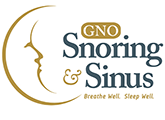In-Office Treatment of Moderate OSA
Clinical History: Pt presented with a diagnosis of Moderate OSA. CPAP was prescribed by the referring physician at a pressure of 7 cm H20 but the patient was unable to tolerate this form of treatment. The patient’s Body Mass Index was 30.5 at the initial visit, categorizing this individual as borderline obese. Seeking further options, the patient presented to GNO Snoring and Sinus.
Physical Exam: A full airway examination in the office revealed blockage at the nasal, palatal, and lingual region. However, during positioning maneuvers in the office, it was apparent that the majority of obstruction occurred at the base of tongue – causing total retrolingual obstruction to airflow. When this patient would lay down for sleep, the base of tongue would relax and fall back, causing full obstruction to airflow. This would result in the patient suddenly awakening at night, with a choking sensation. Furthermore, to his loved ones it would appear that he would stop breathing at night.
Treatment: The patient underwent an in-office radiofrequency ablation of the base of tongue to reduce the retrolingual obstruction from the large base of tongue.
Results:
Pre-op Sleep Study (4/2014)
Apnea Hypopnea Index (AHI): 20 (Moderate OSA)
BMI: 30.5
In-Office Procedure(1/2015): Radiofrequency Ablation Base of Tongue
Post-op Sleep Study (3/2015)
Apnea Hypopnea Index (AHI): 4.1 (Normal)
BMI: 31.9
Summary: Following the in-office procedure, the patient noted an improved ability to breathe both day and night. The nighttime sensations of awakening suddenly with a choking sensation significantly reduced. Furthermore, post surgical sleep study results revealed a correction of his AHI to a normal level. Therefore, given the subjective improvement in daytime energy, improved sleep, and the restoration of his AHI to a normal level – effectively curing the sleep apnea – CPAP therapy was no longer required in this individual.
